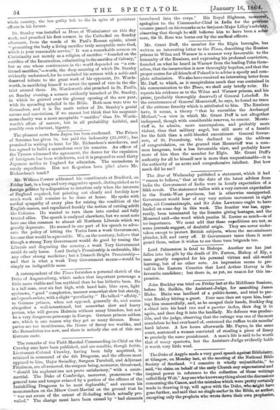Mr. Grant Duff, the member for the Elgin boroughs, has
written an interesting letter to the Times, describing the Russian prisons in Wilna and Warsaw in a manner very favourable to the humanity of the Russians, and expressing his profound conviction, founded on what he heard in Warsaw from the leading Poles them- selves, that the insurrection is now thoroughly hopeless, and that the proper course for all friends of Poland is to advise a speedy and com- plete submission. We also have received an interesting letter from Mr. Duff, to which, as it recapitulates much that was contained in his communication to the Ifmes, we shall only briefly refer. He repeats his evidence as to the Wilna and Warsaw prisons, and his praise. (probably thoroughly deserved) of General Lebedeff. In the countenance of General Monravieff, he says, he found no trace of the extreme ferocity which is attributed to him. The Russians have, it seems, a theory "that he resembles the Archangel Michael,"—a view in which Mr. Grant Duff is not altogether indisposed, though with considerable reserves, to concur. Moura- vieff is, he admits, more unscrupulous, and probably more violent, than that military angel, but still more of a fanatic for the faith than a cold-blooded executioner. General Snwar- row, of St. Petersburg, who declined to sign the address of congratulation, on the ground that Mouravieff was a com- mon hangman, took a less favourable view, and probably knew more of him than the member for Elgin. Mr. Grant Duff's authority for all he himself saw is more than unquestionable—it is the authority of an acute and comprehensive intellect. But how much did he see?






























 Previous page
Previous page